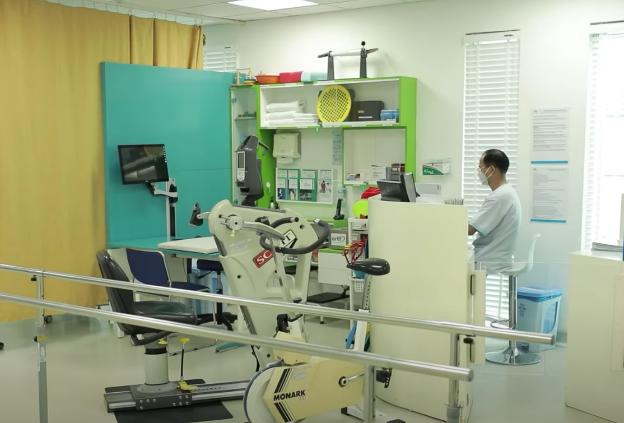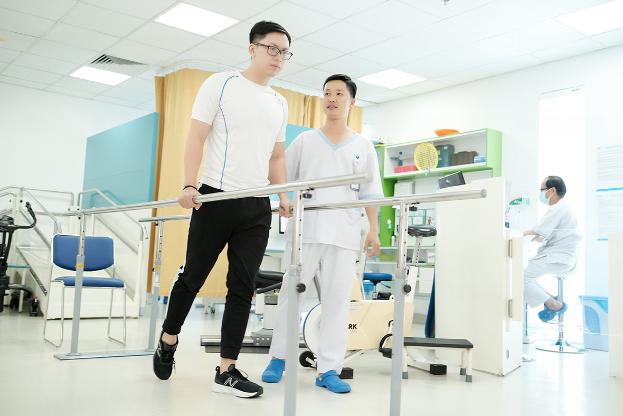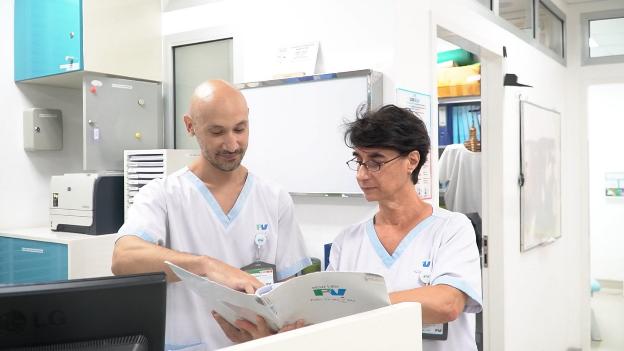Table of contents
To help patients recover faster, shorten their hospital stay and regain mobility more quickly following surgery, FV Hospital’s Physiotherapy and Rehabilitation Department dispatches physical therapists promptly to provide necessary care.
Therefore, within a few days or even a few hours of a major operation, many patients are able to practice walking with trained physiotherapists without pain.
Surgery in the morning, physical therapy in the afternoon
Mr T.T.B., 60 years old, living in Vung Tau, unfortunately broke his heel bone during a fall from the third floor of a building. Mr B. visited FV and underwent surgery to repair the fracture. One day later, Mr B. received physical therapy with Freedom Leg, a specialised device that resembles a prosthetic leg and which helps to reduce bodyweight placed on the heel. Ms. Catherine Cousin, Head of the Physiotherapy and Rehabilitation Department at FV Hospital, says that if this device is not available to assist physiotherapy in the early post-operation stage, after discharge, the patient must keep their weight off their foot for at least three months. Thanks to the early post-surgery physiotherapy programme at FV, Mr B. can walk normally with the support of crutches immediately after being discharged from the hospital.
Mrs N. T. H. (60 years old, living in Ben Tre) was experiencing difficulty walking as moving her leg in a normal range of motion caused her extreme pain, so her family brought her to FV Hospital. Doctors from the Orthopaedics Department diagnosed Mrs H. with osteoarthritis in both knees which could only be addressed by joint replacement surgery. After having both knees replaced at the same time one morning, Mrs H. was guided by experts from the Physiotherapy and Rehabilitation Department to walk a few hours later, combined with cryotherapy, to quickly regain her mobility.

Department of Physiotherapy and Rehabilitation, FV Hospital
Mrs H. was surprised when she was advised to have physical therapy the same day of her operation. Prior to visiting FVH, she thought she would need to be on bed rest and allow the wound to heal before she could exercise. However, it turned out that the early therapy practice did not cause the pain as she thought; on the contrary, it helped her to recover and feel comfortable more quickly. Mrs H. was discharged from the hospital after one week, when she could already walk normally on her own.
“After the surgery, if the patient lies down for long periods, the recovery process might be slower. If a patient is inactive for two to three weeks, even though the wound has healed well, the patient may have to limp as their joints are still stiff. In this case, it can take them much more time and effort to regain normal mobility. Therefore, doctors and physiotherapists at FV Hospital understand the importance of prompt post-operative physiotherapy. We aim to get patients out of bed as soon as possible,” says Ms. Cousin.

Patients who undergo knee replacement at FV Hospital are instructed to practice physiotherapy after surgery
Physiotherapy: applicable to patients with heart and lung disease
In addition to focusing on optimising the body’s function and the health of patients after injury or surgery so that they can return to their daily routine as quickly as possible, the Physical Therapy and Rehabilitation Department also works closely with all other specialties in the hospital, including Obstetrics, Cardiology, Pulmonary and Orthopaedics.
FV Hospital’s physiotherapists provide one-on-one treatment to develop personalised treatment plans based on each patient’s medical history, condition and circumstances, to optimise the recovery progress during their hospital stay and follow-up period at home.
The physical therapy programme also applies to both pre- and postnatal women, to patients who have had surgery for breast cancer or lymphatic drainage, and to patients with cardiopulmonary diseases. Patients with heart and lung diseases must have physical therapy as soon as possible. “If the patient stays in bed for five days after surgery, their risk of pneumonia will be very high, their heart will become weaker and the anaesthetic will not be eliminated well,” adds Dr Catherine.
FV’s Physiotherapy and Rehabilitation Department also provides pre-operative rehabilitation services for patients who plan to have surgery. This programme can help patients with comorbidities such as respiratory disease, COPD and diabetes. For example, asthma patients will be instructed how to inhale and exhale properly. This practice will help to reduce the amount of mucus that causes airway obstruction and reduce their risk of being admitted to the intensive care unit (ICU) after surgery. Physical therapy also helps to activate the body so that the patient can regain their health quickly and recover better, especially when the respiratory system needs to be prioritised during the recovery process.The most important part of physical therapy, according to Ms. Cousin, is to help restore the mobility of the surgical area through activities such as standing up, sitting down, twisting or walking. Professional physical therapy guidance for patients after surgery will help to minimise their risk of falling when they go to the toilet or during other daily moving after surgery. Ms. Cousin further explained that a successful method of early rehabilitation after surgery requires the surgeon to optimise operating time, minimising blood loss and the need for drainage.
Interdisciplinary investment to improve treatment efficiency
FV Hospital appreciates the role of physiotherapy and considers it a highly practical way to improve the effectiveness of treatment for patients, and so has invested systematically in this specialty.
The Department is fully equipped with hand and foot therapy areas, a personal gym, electrotherapy and heat therapy, and a variety of advanced technologies such as Continuous Passive Motion (CPM) machines, lymphatic drainage machines, cardiopulmonary monitoring devices, and a cold compressive therapy device, which helps to cool the surgical area, helping the patient to move around after surgery more easily.

Early physical therapy helps to restore the active mobility of the surgical area
FV Hospital is the only medical centre in Ho Chi Minh City that offers a combination of physiotherapy and osteopathy—a methodology that can shorten treatment time by half. Many patients seek this technique treatment so that they can enjoy a shorter treatment time and recovery, and save hospital costs.

Ms. Catherine Cousin and Dr Stéphane Laporte discuss a patient’s physical therapy regimen
However, Ms. Cousin emphasises that, in the field of physical therapy, machines are just a means of support—the most important resource is human. Physiotherapists at FV Hospital all have university degrees or higher and are well trained, domestically or abroad. All specialists have passed rigorous FV training programmes and treatment processes are overseen by two doctors with PhDs and one doctor with an MSc. Ms. Catherine Cousin holds a PhD in Physical Medicine & Rehabilitation from the National University of Medical Sciences, Madrid, Spain, earned in 2019. Ms. Cousin has participated in many NGO projects in Vietnam and other countries around the world.
Please contact (028) 54113333 for advice on rehabilitation and physiotherapy at FV Hospital.



